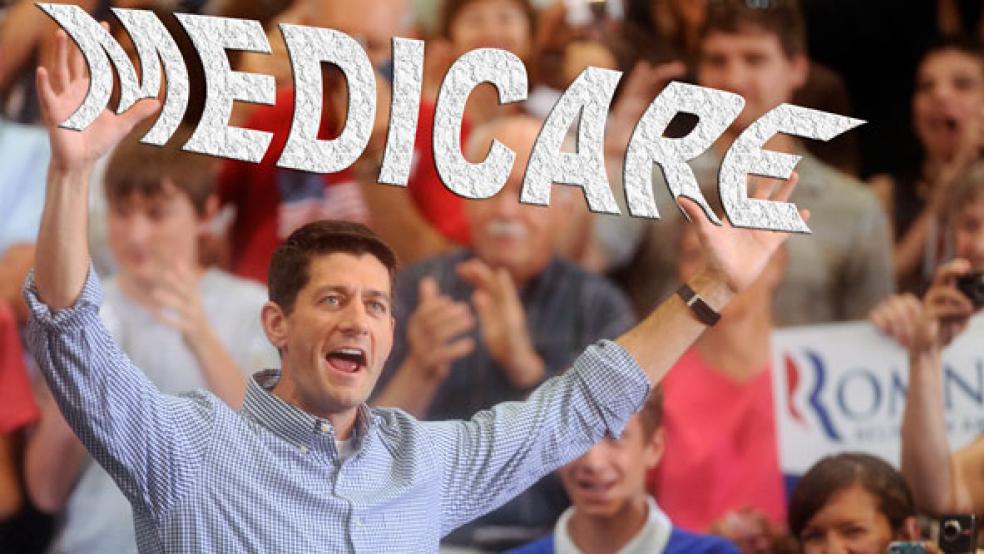Most of the budgetary focus of the past month has settled on the sequester that hit on March 1, and the scare stories spun by the president and his fellow Democrats over what amounts to a temporary spending increase of less than 2.3 percent of the federal budget.

Whatever attention left unoccupied by the posturing and hyperventilation on spending cuts has gone to the comparatively long-term issue of the expiring continuing resolution on March 27th and the fight between cuts and tax hikes demanded by Republicans and Democrats. Almost no one has bothered to look past the present at all, not even to the next budget cycle, even though regulations require Congress to address it by mid-April.
Paul Ryan is one of the few considering the long-term trajectory of federal spending who is also preparing a solution without artificial fiscal cliffs. Perhaps surprisingly, his ideas for structural budget and entitlement reform have some Republicans howling even before Democrats get an opportunity to speak up.
Before we get to Ryan’s new ideas, we should recall his old plans for budgetary reform. When Ryan first became chair of the House Budget Committee in 2011, he brought a rafter full of proposals for reforming entitlement programs, the biggest driver of annual budget deficits and national debt, both now and especially in the future.
His first budget overhauled the approach to Medicare and Medicaid, relying on market-based cost containment systems to create a fixed-contribution system. He assumed that private insurers would stabilize costs, which opponents almost instantly derided as “vouchers” – even though it used the same kind of exchange system for seniors that Barack Obama and Democrats had imposed for everyone else in the Affordable Care Act the previous year. Democrats created TV ads showing a Ryan look-alike pushing a wheelchair with an elderly woman in it over a cliff, in one of the least subtle attack ads of recent memory.
In the next budget cycle, Ryan adjusted the plan to address some of the criticism and to expand its support beyond the GOP. For a while, Ryan partnered with Senator Ron Wyden, a liberal Oregon Democrat, on Medicare reform that once again centered on a fixed cost to the government through insurance exchanges, this time with an option for traditional government-run Medicare.
By April, Wyden’s staffers told The Hill that Wyden and Ryan had perhaps as many as a dozen Senate Democrats ready to support their concept for reform. Four months later, though, Mitt Romney chose Ryan as his running mate in order to build conservative enthusiasm for his presidential campaign, and Democratic cooperation vanished on structural Medicare reform entirely.
At the time conservatives had their own issues with Ryan’s budget proposals. While they appreciated the structural reform of Medicare that allowed the government to fix the cost of health-care support, they did not like how long it took to bring annual deficits to an end. Under Ryan’s modified second plan, annual budgets didn’t balance until sometime in the late 2030s, and conservatives balked at endorsing a plan for continuing budget deficits for the next 25 or more years.
Hence, Ryan 3.0 will accelerate the curve of deficit reduction to ten years. In order to do that, though, the changes in Medicare will have to start sooner, and the Republican pledge (which Ryan himself made) in 2012 to exempt anyone 55 or over may go out the window. This has raised the ire of moderate Republicans, briefed at a caucus luncheon on Tuesday, who worry that this will backfire on Republicans who insisted that current incumbents will get roasted for breaking that pledge.
“A lot of people had made commitments at 55,” The Hill quoted an unnamed Republican congressman as saying after the meeting. “In other words, in the campaign, [Republican vulnerable members] said it wouldn’t affect your Medicare for retirees or near retirees for those 55 and up ... and [if] this budget forces them to renege on that, that would be problematic for many.”
On the other hand, Rep. Tom Cole went on the record to tell The Hill that the pledge was actually two years old and that window has already passed. “If we said we’d gotten what we’d wanted last year and the year before, [it] would have started at 55.”
But how bad will this actually be? I asked for a comment from Rep. Ryan’s office, which released a statement in response to the criticism:
“Chairman Ryan has made clear that the House Budget Committee will advance a responsible, balanced budget. Every family must balance its budget, and Washington should too. We invite the president and Senate Democrats to join us in this common-sense goal.
“With respect to Medicare, House Republicans will again put forward a real solution to protect and strengthen Medicare for current seniors future generations. His reforms ensure no changes for those in or near retirement, a sharp contrast to the real harm inflicted on seniors by the president’s health-care law. It will be interesting to see how Senate Democrats respond to the critical need to reform Medicare. After nearly four years without a budget, will leading Senate Democrats remain complicit in the looming bankruptcy of Medicare?”
A House GOP aide later told me that nothing had yet been carved into stone, describing the luncheon meeting as part of an ongoing collaborative effort. The shift from a 25-year time frame to 10 years for balancing the budget required an accelerated reform schedule, but he also stressed the package wouldn’t contain any dramatic cuts or policy changes from the previous Ryan reform package.
The general concepts will remain, including means-testing to make sure that support goes where it’s needed rather than to those who can afford to carry more of the cost. That is easier to do in Ryan’s fixed-contribution model than it is in the traditional fixed-benefits Medicare model we use today.
The context of American credit has to be kept in mind as well. The prolonged trajectory to budget balance in Ryan’s previous efforts would not have done much to bolster confidence in the dollar, or credit ratings for US debt. Entitlement reform requires changes to statutes rather than annual budgets, so the cost savings in that action are more reliable, but future Congresses could still undo those changes depending on the politics of the time – and 25 years creates a lot of opportunities.
A 10-year window provides a much shorter time frame for vigilance and a much better chance for successful completion of the reform. The faster these costs come under rational control, the more quickly investor confidence will return, and economic growth may even end up accelerating the end of budget deficits.
The debate is still somewhat premature. Ryan and the House Republican leadership still have to craft a formal budget proposal putting these concepts into action, and at that point we can see what kind of sacrifices need to be made to bring the debt crisis to heel. The longer we wait, though, the more we will have to ask from more Americans to fix the problem, and the more difficult it becomes to solve the problem at all.
Thankfully, at least a few of our elected officials are at least considering consequences in terms longer than just the closest manufactured crisis.






